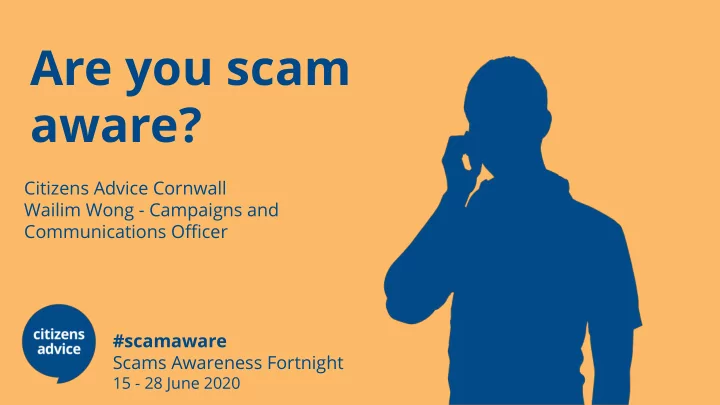

Are you scam aware? Citizens Advice Cornwall Wailim Wong - Campaigns and Communications Officer #scamaware Scams Awareness Fortnight 15 - 28 June 2020
A scam is a scheme to con people out of their money. 7 out of 10 people have been targeted by scammers in the last 2 years.
Most victims don’t report scams. But the impacts can be huge - people can: lose their life savings ○ suffer emotional trauma or mental health problems ○ lose their confidence ○ suffer long-term health problems ○
Coronavirus scams Protecting ourselves and others against scams is more important than ever this year due to the coronavirus crisis. Our data shows many new scams have emerged during the pandemic, including: adverts for face masks or medical equipment at high prices ● adverts selling fake cures for coronavirus ● emails or texts pretending to be from the government ● emails offering life insurance against coronavirus ● people knocking at the door and asking for money for fake ● charities
Common scams Scams can affect anyone, so it’s important to know how to spot one. Common scams include: Emails scams. Harmful links are used to deceive people into revealing ● personal/financial details. By spoofing emails, email addresses, websites and payment services, scammers can trick people into believing they are dealing with genuine banks, traders and/or authorities (e.g. the Government). These are also known as copycat scams. Upfront payment/fee scams. This covers a wide range of situations ● and scam delivery channels, but they usually ask for an upfront payment to unlock either a cash prize, a PPI claim amount or for initiating a service.
Doorstep selling. These all begin with the person getting an ● unrequested knock on their door. They are often for expensive home improvements which the victim did not want or was pressured into. Investment scams. Often conducted either online or over the phone, ● these can result in people losing thousands of pounds for non-existent stocks, shares and other investments such as rare wine or art. Average losses are very high. Antivirus/computer. People are cold called and told they have a ● problem with their computer which, for a fee, can be fixed. Alternatively the victim might initiate the contact in response to an online advert or prompt claiming that their device has been infected with a virus.
You can find out more about current scams on Action Fraud’s website at www.actionfraud.police.uk/news.
Suspect a scam? There are 4 important things you can do if you suspect you’re the target of a scam: 1. TAKE ACTION Contact your bank or credit card company (if payment or ● banking details are involved in the scam). If the scam is a pension transfer, contact the provider ● immediately, along with the Pensions Advisory Service . Protect yourself from further risks. For example, if a scammer ● has gained access to your computer reset your passwords and update your antivirus software. Gather all the details of the scam. ●
Suspect a scam? 2. SEEK ADVICE Get advice from the Citizens Advice consumer service on ● 0808 223 1133 , or on 0808 223 1144 for a Welsh-speaking adviser. You can get advice directly from a Scams Action adviser by calling 0808 250 5050 . Scams advice and information can also be found online at ● www.citizensadvice.org.uk/sa20. The Citizens Advice consumer service can also report ● problems to Trading Standards on your behalf.
Suspect a scam? 3. REPORT Report scams and suspected scams to Action Fraud on ● 0300 123 2040 or at www.actionfraud.police.uk . Action Fraud is the UK’s national reporting centre for fraud and internet crime. The Crime Survey for England and Wales suggests that only 1 in 7 ● fraud incidents either come to the attention of the police or are reported to Action Fraud. Reporting not only helps to inform the work of advice or ● enforcement agencies like ourselves and Trading Standards; it also helps to prevent future scams.
Suspect a scam? 4. TALK As a nation, we still don’t talk enough about scams. ● 7 out of 10 people targeted by a scam do not tell anyone about ● it, including friends, family or the authorities. Talking about scams can help reduce the stigma and help protect ● others from falling victim. Tell family, friends, neighbours about your experiences so that they ● can avoid scams and find out how to protect themselves.
Top tips to avoid coronavirus scams If you see emails or texts about coronavirus from someone you don't know, ● or from an unusual email address, don't click on any links or buy anything . Read emails or texts claiming to be from the government or official services ● carefully. Look out for spelling errors or typos - these could be a sign that they’re not legitimate. If you need a government service, go to gov.uk to access it rather than clicking on a link in an email. If someone knocks on your door and offers to help with food shopping, do ● not hand any money over until they have returned and given you the food.
General tips to avoid scams Stop and think before parting with your money or information. Don't give ● money or personal details to anyone you don't know or trust - for example, someone who knocks on the door offering to help. If you’re contacted out of the blue - be suspicious. ● Say no to cold-call investments and pensions reviews. ● It’s ok to refuse requests - only criminals will try to rush or panic you. ● Your bank will never phone you to ask for your PIN or online banking password. ● If you haven’t bought a ticket - you can’t win it. ● You shouldn’t have to pay anything to get a prize. ●
Thank you.
Recommend
More recommend